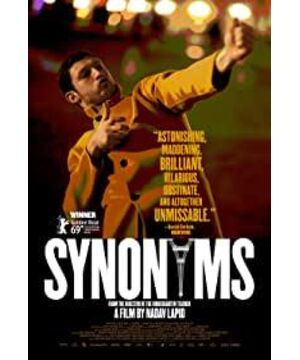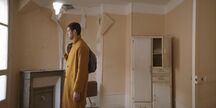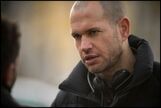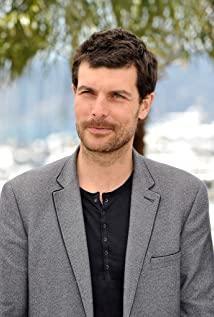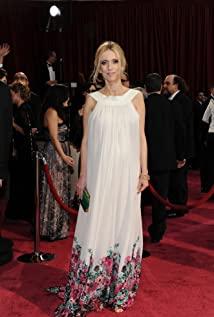One word review:
First give a word, then look for its synonym, and then look for the synonym of this synonym, and the word found at the end has actually deviate from the original one.
It’s October, and film festivals around the world are drawing to a close. The high-profile European “Big Three” also handed in all their answers at the beginning of the month. First, Feng Junhao won South Korea’s first Palme d’Or, and then DC Comics. The work "Joker" won Venice.
Perhaps many fans are wondering why this year's genre films are favored by European art film festivals. Because of the uncertain jury lineup of Europe's "big three", it is still too early to judge the trend. On the contrary, this year's Berlin Golden Bear is the most suitable for people. As expected, the winning entry is a relatively "artistic" art film.
So today, let's talk about the film "Synonyms" that won the Golden Bear with the highest score of 3.0 in the field.
Coincidentally, whether it is "Parasite", "Joker" or "Synonym", they are all contemporary fables to some extent, but the first two tend to be more typological, and the interpretation direction is relatively more concentrated.
"Synonyms" is a film that makes it difficult for the audience to empathize. The film narrates the cultural identity of immigrants from a completely personal perspective, and even part of the background experience of the protagonist is adapted from the director's personal experience, which directly affects the audience. Not big, the authorship of the film is developed from the perspective of high-level intellectuals. It is a film with very diverse perspectives, and it is difficult to generalize and label the film.
This kind of movie is almost the limit of my current appreciation ability. I hope everyone will forgive me for the simple picture below.
The story is about a male protagonist from Israel, Raf, who came to France alone out of disgust for the living environment. After giving up his native Hebrew, he worked hard to learn French (reciting synonyms), eager to integrate into the ideal society in his mind, and finally A story that ended in failure.
This seems to be an old-fashioned cultural identity issue, but as I said earlier, this film makes most audiences unable to empathize. Although this is an art film, there is no "people" in the film. Its uniqueness is that the director uses a large number of common symbols to complete the expression of its ambiguity.
There are two types of symbolic combinations in movies, sentence patterns and paradigms . Sentence structure suggests that different arrangements of shots in linear and temporal order lead to different meanings, similar to the simplest montages: a close-up of a crying child, a close-up of a laughing child, a panorama of a cat approaching, by changing the shot The order of assembly can achieve a completely different effect. During the French New Wave period, artists carried out more in-depth practice. (I forgot who it was)
The second is the paradigm structure, which is not temporal or spatial, and symbols will generate meaning through association, which is biased towards psychological research. For example, when an old man falls, we immediately think that he will be weak, and he may even be leaning on a cane. So symbols can have endless meanings through the combination of sentence structure and paradigm structure, and semiotics also provides a way of generating meaning in movies, but because the study of semiotics is not repeatable, that is, the repetition of items each time Not necessarily the same result, semiotics is not recognized as a science, but as a culture.
To be abstract, the film "Synonyms" is about a person who, with a longing for symbols, wants to integrate into a country's culture by changing the language and learning symbols (synonyms), but as a result, he is born by this culture. Unconscious symbols completely defeated.
When we see the male protagonist Ralph in "Synonyms" in a state of nothing and hunger, the association based on symbols will inevitably sympathize with him, but in the next naked shot, he shows a perfect and muscular man in front of the audience. The body, like the stone sculpture of the hero in Greek mythology (Ralph himself is an expression of asexuality, and he was rescued in the bathtub is also quite ritualistic), it will give people a kind of pressure of submission, and the body language resists the so-called so-called sympathy.
It's hard to resonate with Love's encounters and the stories he tells, but from the connection between the two core concepts of "body" and "language" in the film to Director Rapid's stylized audio-visual language, we can glimpse the camera and the Resonance between personal narratives.
"Synonyms" has a certain autobiographical quality. The director, Rapid, draws nutrients from his cross-cultural experience as an Israeli immigrant. In the film, he not only mocks his own country's culture, but also uses a series of ambiguous characters. The "love triangle" relationship completes a keen insight into French society.
At the beginning of the film, Ralph is anxiously walking on the streets of France, and the camera has reached a subtle shaking relationship with him. In the personal narrative, the movement of the camera is the externalized expression of the character's state of mind. When Raf broke into Paris for the first time as an outsider, the camera was also in a state of dissociation. When he happened to enter an apartment, the crisis of no fixed place was temporarily lifted, and the camera also turned to calm.
Yet the drama of the story is often deviated from the characters, as in the fixed shot of Raff just entering the room, where the lights are turned on in the depths of the field, but after a while he appears in a position further away from the audience. The camera erratically captures Raff's movement, while his clothes are dramatically stolen upon entering the new apartment, leaving the character trapped in the unfamiliar apartment.
In this regard, Raf, who had nothing, began his road of identity in French society, and completed the loop at the beginning and end with the two core concepts of body and language. A French couple, Emile and Caroline, found Ralph sleeping in the bathtub. The first feature they noticed was Ralph's circumcision. Caroline had a physical curiosity, so she quickly covered Ralph's body. The lower body, while Emile has a curiosity about exotic cultures. (Circumcision is the circumcision of Judaism and Muslims, which is a major life ritual)
Emile, a third-rate writer, was inspired by Raf for his exotic stories of Israel, and he provided Raf with material assistance. Ralph's military career is a major reason for his disgust with his country's environment, so his account is also a self-medication.
When he came to France, he refused to speak his native language Hebrew. Raf may not have a strong yearning for France, but language is the only part of human identity that can be changed through personal efforts (philosophical level). to demonstrate his determination to change his old identity.
However, the protagonist Ralph's yearning is not as simple as acquiring a French identity. He is loyal to a humanitarian ideal. What the film then shows is that an idealized identity cannot be realized in France, and he cannot really distinguish himself from the original culture. A double tragedy of boundaries.
In the conversation with his fellow villagers, Raf said that he admired Hector (Prince of Troy) in "Illyland" very much, but under the influence of the national character of martial arts and war, his fellow Israelites categorically stated that the hero was killed by Akha Lucy chased around the city wall, a coward.
And he thought that in France, where ancient Greek culture was widely recognized, it would definitely be able to show the light of humanitarianism. So when he became a security guard, in the pouring rain, he shouted a declaration that his fellow Israelis could not be exposed to the rain, completely disregarding the regulations, and the result was dismissed by the company.
Raff speaks Hebrew only twice in the film.
Once when I went to an immigrant training class, the arrogant teacher asked everyone to sing the national anthem of their own country in their native language. When it was Raf's turn, he "sang" the national anthem by reciting, and did not listen to the teacher's words and stopped in time.
At the same time, the camera gave a very aggressive close-up, and the implication was very strong. Only I was qualified to abandon and break away from my own mother culture, and others had no right to intervene.
However, when he recited the French national anthem in the last class, he specifically asked to increase the volume. The bloody violent revolution described in the French "Marseillaise" triggered Israel's DNA of martial arts and war (Raff's temporary addition was also influenced by the mother culture.) rhythm), there is still the mother culture that Ralph is eager to give up under the foreign cultural shell.
The two core concepts of body and language are closely linked, and Raff has no choice but to sell his body to become a nude model.
The perverted "artist" asked him to lie on the floor, perform obscene gestures, and utter all kinds of foul language in Hebrew. The attitude of the aboriginal French towards Ralph here has returned to the original state. The curiosity about the body and the curiosity about the exotic culture, the process of selling the body and the speaking of the mother tongue are carried out simultaneously. While speaking in his native language, Ralph mixed with a few sentences "What am I doing here?" , apparently at a loss for himself to play an exotic image, to be violated and materialized.
After the assault, the "artist" found another girl from Lebanon to shoot obscene videos with Raf, but he ignored him on the grounds of conflict between the two countries. Raf observed through a screen (similar to a crack in a door) The girl ran away after a while (subjective shot). After jumping and cutting, he directly received that Raff met Emile on the street. Raff offered to return the story he told him. After being rejected, Raff could no longer knock on the door of Emile's house.
The meaning of the film's series of cuts is that when Ralph thinks he has become acquainted with the French and is beginning to integrate into the mainstream cultural environment, the French have always regarded him as a plaything to kill time, and he will immediately bump into the insurmountable. cultural barriers. Emile doesn't think his story has any significance at all, his writing is the embodiment of middle and upper-class nihilism, Caroline is only interested in his body, saying that he is just a "play" with himself for six years. month boy. Raff's last riot at Notre Dame was just an extreme reaction after Western civilization failed to persuade outsiders to fail.
The performer tried to cover up the accusation raised by Ralph with music (for example, France is a democratic country), just as Ralph walked down the street with his head down and recited a series of synonyms to cover up the noise, the two types of symbols talk like ducks, and there is no reconciliation at all. (Although it is a concept first, "Synonyms" does not put forward the hypothesis of reconciliation and solve it, but tells us why the two types of cultural symbols are impossible to reconcile), just like no country can be described by a bunch of synonyms at the same time.
Although the audience of "Synonyms" is destined not to be too broad, and the Europe that it cares about is also incompetent with us, I recommend everyone to appreciate the talent of the director Lapid, rather than the value of watching this film. The text and the image are in the same line, and the director's ability is terrifying to the point of no dead ends. I look forward to his next works.
View more about Synonyms reviews


